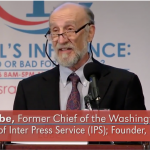The initial attacks against Chuck Hagel as Secretary of Defense included a virtual mantra that the former Nebraska senator was “out of the mainstream” of thinking on the Middle East. Even in his endorsement of Hagel yesterday, Tom Friedman noted that “some of his views are not ‘mainstream.'” But that’s nonsense, particularly when it comes to the Middle East. The fact is this: Hagel’s views on the Middle East — favoring a “lighter footprint” in the region; taking a more even-handed approach to the Israeli-Palestinian conflict; strong skepticism about any U.S. military intervention in Syria, and military intervention in general; opposition to an Israeli strike against Iran’s nuclear program — very much reflect those of a significant majority of the U.S. public. We know that because poll after poll of U.S. public opinion during the last year and more shows it.
Now, as Elliott Abrams predictably points out on his blog about the results of a new Pew poll, it’s absolutely true that a significant plurality of Americans sympathize more with Israel than with the Palestinians. That is not in question and has been true for a very long time. But note in his post how he complains about public attitudes toward intervening more in Syria’s civil conflict, a position he and other neo-cons have been pushing for a long time. (Of course, Elliott blames Obama for the lack of public enthusiasm for intervention, just as he blames close to everything which, in his view, goes bad in the region, on Obama’s passivity or some other flaw, never recalling that his work as George W. Bush’s chief Mideast aide helped dig the deep hole which Obama has been trying to climb out of.) According to the poll, nearly two-thirds of respondents said they feel the U.S. has no responsibility for involving itself in Syria, and 65% oppose even the arming of anti-Assad rebels. So it’s the neo-cons’ interventionist views that, in this case, are clearly “outside the mainstream.” Similarly, take a PIPA poll from early October this year. Asked whether the U.S. should become more or less involved in the Middle East, 23% opted for the former. But a whopping 63% said the U.S. should become “less involved.” Again, the neo-con view doesn’t represent the “mainstream.” Hagel — and Obama, for that matter — seems much closer.
But back to the U.S. public’s views about Israel (and I apologize for not doing a more thorough analysis, but the circumstances in which I find myself over this vacation are such that I can’t do the kind of research and linking I’d like to). What worries the neo-cons and the Israel lobby about Hagel is that, while he supports Israel, he doesn’t see it as having the same or, in some cases, similar interests and values as the United States. At times, he even sees big differences in interests between the two countries, especially in the Middle East. Neo-cons and the Israel lobby, on the other hand, are devoted to the proposition that their interests and values are one and the same. To some extent, the success of those efforts is reflected in the greater sympathy that a large plurality of Americans feel for Israel, as opposed to the Palestinians. (There are other reasons why this is so, too.)
But let’s consider just a few polling results over the past year that might shed some light on how the general public perceives the convergence of U.S. and Israeli interests. Back in February, Gallup did their annual survey of the favorability ratings of individual countries around the world. If the Israel lobby had its way, Israel would rank at the top, but that’s not the case at all. In fact, while Israel ranks relatively high, it’s quite amazing to consider which countries are considered more positively. Of course, the leading Anglosphere countries top the list, with Canada at 96%, Australia at 93%, and Great Britain at 90%. One would expect Israel to come in at right around Britain’s level, but that’s not the case. Germany ranked #4 at 86%, followed by Japan at 83%; and — get this! — perfidious France, which only ten years ago almost lost its claim to fried potatoes sold in the Congressional cafeterias because of its opposition to the neocon-inspired invasion of Iraq, scored 75%. And, tied with France was…India(!!!!), which has no serious military relationship, let alone an alliance, with the U.S. and won’t even buy our nuclear plants or fighter jets. Only then, after France and India, comes Israel, at 71%! While the view of Israel is still clearly positive, it hardly suggests that the general public, unlike the Congress and its many standing ovations for Bibi Netanyahu, accepts the Jewish state as its BFF, as Abrams et. al. seem to think.
Also take a look at the latest in a series of quadrennial polls conducted earlier this year and released in September by the Chicago Council on Global Affairs. While the general public hopes to reduce direct U.S. involvement in the Middle East, a 50% plurality said one of the very few situations in which they would support the deployment of U.S. troops there would be as part of a peacekeeping force to help ensure an Israeli-Palestinian settlement. Asked how they would feel if Israel was attacked by its neighbors, a 50% plurality would oppose the U.S. taking any military action; 47% percent said they would favor it.
Asked about U.S. economic aid to Israel, a mere 11% said it should be increased and another 45% said it should remain the same. But 23% said it should be reduced, while 18% said it should be halted altogether. Forty-one percent is not insignificant. Similar figures applied to military aid (which Congress and the administration continue to increase, what with Iron Dome, etc.)
Most important — and this goes to the latest Pew stats cited by Abrams — the Council asked about what side, if any, the U.S. should take in the conflict between Israel and the Palestinians. While 30% said Washington should take Israel’s side and only three percent said it should side with the Palestinians, a strong 65% majority said it should take neither side. This is consistent with virtually all polling done on this question, which, it bears repeating, is far more relevant than the question of which side you sympathize with most. The fact is, around two-thirds of the U.S. public believes Washington should act as an honest broker between the two sides, which, as I understand it, is what Hagel has long argued. Again, on this, it’s the neo-cons and the Israel lobby that lie outside the mainstream, as do the vast majority of members of Congress, judging by all the AIPAC-drafted resolutions, statements, and letters they sign on to.
Finally, the Chicago Council asked respondents to say what they would prefer the U.S. do if Israel attacks Iran’s nuclear facilities, and Iran then retaliated against Israel. The question was, should the U.S. “bring its military on the side of Israel against Iran?” Thirty-eight percent of respondents said yes, but a 56% majority said no. (Joint Chiefs of Staff Chairman Mark Dempsey, of course, also suggested his answer would be no.) Of course, this is not the reigning view in Congress, at least at the moment.
As I noted, this is a pretty cursory glance at some polls about how the general public sees the identity or difference in interests between the U.S. and Israel. But I’m confident that if you troll among many polls, these results would be pretty representative. Like Hagel, the general public has expressed support in various surveys for a two-state solution along the Clinton parameters, but I don’t think most neocons support that, while the Israel lobby takes its cues from Bibi whose sincerity on the issue is subject to considerable doubt, particularly in light of the most recent settlement announcements. Again, it’s the neocons who appear outside the mainstream, certainly not Hagel. The disconnect here is found in Congress where the lobby exercises its greatest influence. Indeed, the measure of the influence — and/or intimidation — exerted by the lobby can be seen precisely in that disconnect between Congress (and the Beltway Bubble) and the general public.
Photo: Junko Kimura/Getty Images





